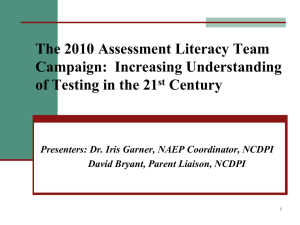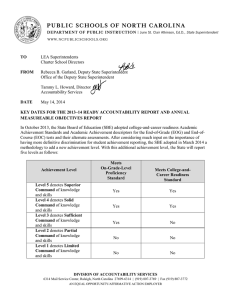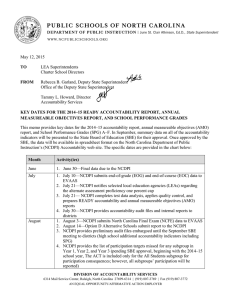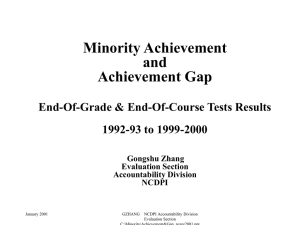NORTH CAROLINA STATE BOARD OF EDUCATION Policy Manual Policy Identification
advertisement
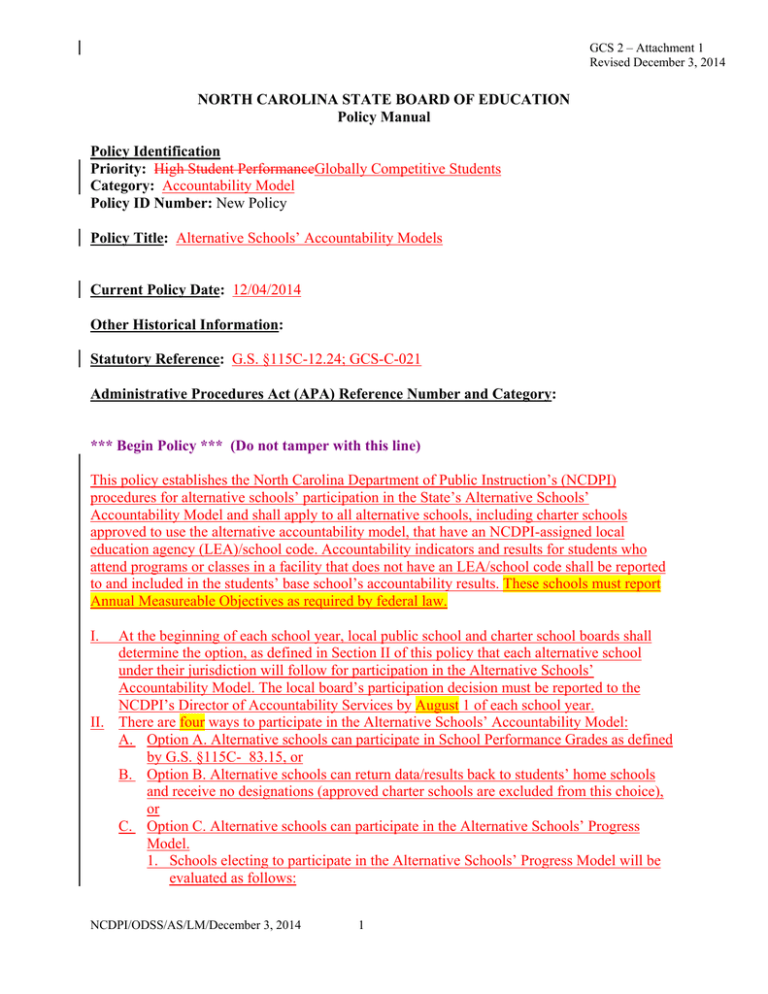
GCS 2 – Attachment 1 Revised December 3, 2014 NORTH CAROLINA STATE BOARD OF EDUCATION Policy Manual Policy Identification Priority: High Student PerformanceGlobally Competitive Students Category: Accountability Model Policy ID Number: New Policy Policy Title: Alternative Schools’ Accountability Models Current Policy Date: 12/04/2014 Other Historical Information: Statutory Reference: G.S. §115C-12.24; GCS-C-021 Administrative Procedures Act (APA) Reference Number and Category: *** Begin Policy *** (Do not tamper with this line) This policy establishes the North Carolina Department of Public Instruction’s (NCDPI) procedures for alternative schools’ participation in the State’s Alternative Schools’ Accountability Model and shall apply to all alternative schools, including charter schools approved to use the alternative accountability model, that have an NCDPI-assigned local education agency (LEA)/school code. Accountability indicators and results for students who attend programs or classes in a facility that does not have an LEA/school code shall be reported to and included in the students’ base school’s accountability results. These schools must report Annual Measureable Objectives as required by federal law. I. At the beginning of each school year, local public school and charter school boards shall determine the option, as defined in Section II of this policy that each alternative school under their jurisdiction will follow for participation in the Alternative Schools’ Accountability Model. The local board’s participation decision must be reported to the NCDPI’s Director of Accountability Services by August 1 of each school year. II. There are four ways to participate in the Alternative Schools’ Accountability Model: A. Option A. Alternative schools can participate in School Performance Grades as defined by G.S. §115C- 83.15, or B. Option B. Alternative schools can return data/results back to students’ home schools and receive no designations (approved charter schools are excluded from this choice), or C. Option C. Alternative schools can participate in the Alternative Schools’ Progress Model. 1. Schools electing to participate in the Alternative Schools’ Progress Model will be evaluated as follows: NCDPI/ODSS/AS/LM/December 3, 2014 1 a. Components used in the overall school score: (1) 20% Student Persistence (a) Student Persistence is defined as the percent of alternative students who remain enrolled in any North Carolina public school through the end of the school year. (2) 20% School Achievement (a) The School Achievement component uses the following indicators: (1) End-of-Grade (EOG) English Language Arts/Reading and Mathematics Assessments at Grades 3–8 (2) EOG Science Assessments at Grades 5 and 8 (3) End-of-Course (EOC) Assessments in Biology, Math I, and English II (4) The ACT (5) ACT WorkKeys (6) 4-Year Graduation Rate (7) 5-Year Graduation Rate (8) Math Course Rigor (b) Three (3) years of data will be used for calculating school achievement. (3) 60% Growth (a) Growth will be calculated using an alternative growth model developed in conjunction with EVAAS. b. A change rating will be assigned to schools comparing their previous year to the current year. For 2014–15 (the baseline year), all schools will receive the same rating. (1) Progressing (a) Progressing indicates a change in the school from the previous year by at least +3 points. (2) Maintaining (a) Maintaining indicates a change in the school from the previous year by 2.9 to +2.9 points. (3) Declining (a) Declining indicates a change in the school from the previous year by at least -3 points. D. Option D. The alternative school may propose its own alternative accountability model for approval by the State Board of Education (SBE). 1. The proposed model must include criteria for achievement and growth. 2. A request for Option D must be submitted annually to the SBE for approval at its October meeting. 3. For the 2014–15 school year only, all requests for approval of Option D must be submitted to the SBE by February 1 for decision in March. III. Schools that are identified as Developmental Day Centers (as determined by the Department of Health and Human Services) and schools which are providing special education and related services in public separate settings to students with disabilities who are significantly cognitively delayed, have multiple handicapping conditions, and may also have significant behavioral or sensory integration needs shall participate in accountability by (1) administering the appropriate assessment to all eligible students, NCDPI/ODSS/AS/LM/December 3, 2014 2 (2) reporting Annual Measurable Objectives for all student subgroups, and (3) participating in either Option B, Option C, or Option D as defined in Section II of this policy. These schools are not required to report a School Performance Grade. To participate in this model, schools who meet the criteria in this section will be reviewed and affirmed by the Exceptional Children’s Division and the Accountability Services Division. NCDPI/ODSS/AS/LM/December 3, 2014 3

